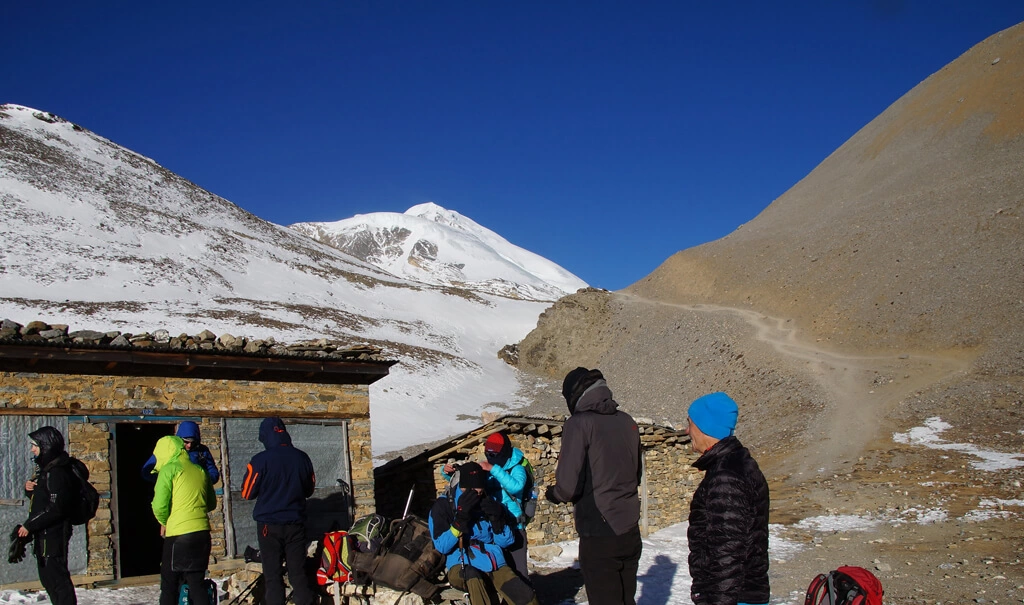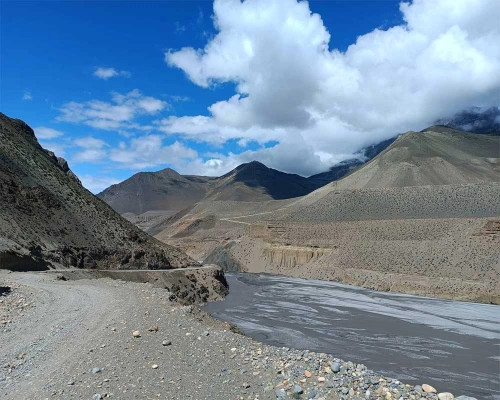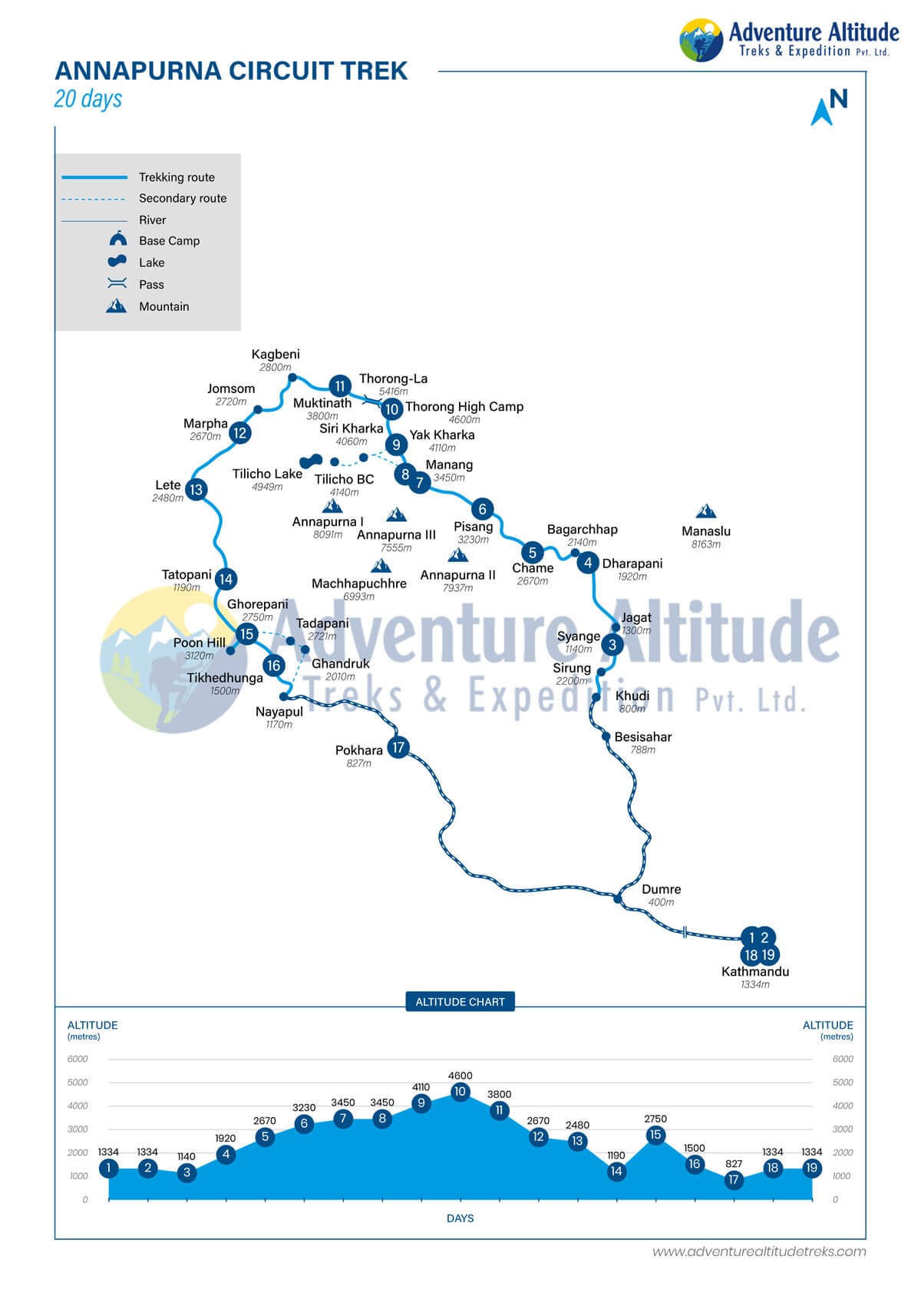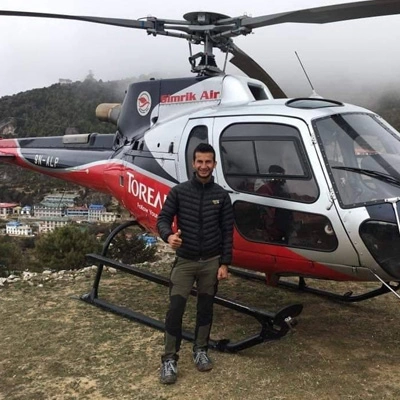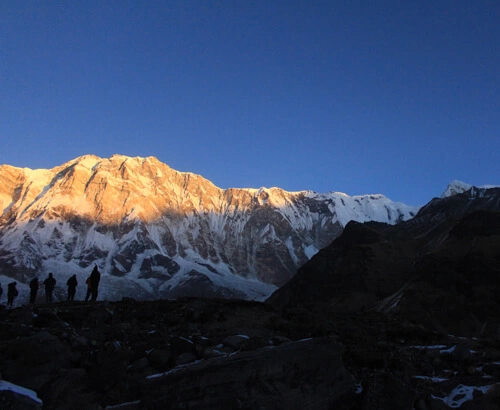Annapurna Circuit Trek, a distance of 220 km long with a duration of 18 days, ranks as one of the most famous hiking routes in the Nepalese Himalayas. The tour offers a magnificent journey up the high hills, unveiling the different cultures in their natural surroundings.
This is one of Nepal's classic treks. You reach Thoronga La, 5,419m above sea level, along the footpath that passes through a subtropical jungle and a high-altitude plateau.
After a beautiful drive from Kathmandu, the Trek starts at Syange for the Annapurna Circuit. You will walk from Syange to Dharapani and up to Chame at 2,610m. You will follow Marsyangdi River through the village of Chame to Pisang at 3115m and up again to Manang at 3540m.
It is one day's acclimatization at Manang, followed by the next day's journey to Yak Kharka (4,050 meters). Walk further westwards to Thorong High Camp via Thorong Phedi (4525m).
We ascend towards Thorong La Pass (5,416m) from Thorong High Camp in the morning and try to reach the top before noon to avoid the afternoon wind. On reaching Thorong La pass (5416 m above sea level), you descend to Muktinath (3760 meters), a holy site of worship of Hindus and Buddhists. You will then proceed to Lete after trekking from Muktinath to Jomsom.
You again resume your Annapurna circuit hike from Lete and move to Tatopani, famous for its natural hot springs. Your tired muscles will be soaking up the heat in the hot springs.
Therefore, your next point of destination will be Ghorepani. You start your Trek from Ghorepani to Poon Hill, the top and favorite viewpoint in Nepal. Later on, you will trek to Tikheldunga after enjoying panoramic views from Poon Hill.
Next, we will walk from Tikhedhunga to Nyalapul and drive to Pokhara. You shall stay overnight at Pokhara before returning to Kathmandu the following day.
This Trek allows hikers to appreciate nature within the Annapurna region, like green forests, terrace farms, snowy mountains, and sharp canyons. Trekkers will come across different varieties of plants and wildlife, like the native bird and the Danfe, among others, during the trip in the Himalayas.
Additionally, the 18-day Annapurna Circuit Trek provides a chance to indulge in the distinct culture and lifestyle of the area, along with interaction with natives from generation to generation.
The locals' warmth, culture, and stories they tell all form an unforgettable experience.
Although the usual itinerary for the Annapurna Trek circuit takes 18 days, it can be adjusted and completed within 7 - 28 days depending on availability of time, starting point as well as ending point, fitness level, walking rate, and other factors.
How do you reach the Annapurna Circuit Trekking starting point?
Annapurna Circuit Trek in Nepal provides breathtaking scenery and tough walking trails. The Trek offers amazing views of peaks such as Annapurna, Dhaulagiri, and Machhapuchhre, over 4,000 meters high. It is an arduous hike, but high elevations and rough terrains require proper preparation beforehand.
But the main question might be how to reach Annapurna Circuit Trekking Starting Point. Your wait is over; we are here to help you briefly with the location.
Adventure Altitude offers a standard package of Annapurna Circuit Trekking that starts from Syange and passes through several villages and settlements. But to reach Syange first, trekkers must arrive at Pokhara and then drive to Syange. It takes around 7 hours to reach Syange from the beautiful city of Pokhara. And the best thing is whole transportation services is included in this trek pacakge with us.
To reach Pokhara, trekkers can either book a flight or get on a ride on a public bus or jeep. The flight duration from Kathmandu to Pokhara is around 20 to 25 minutes, and the cost will be around NPR. 5000 to 7000, depending on the season you travel.
Similarly, the cost of traveling by bus is around NPR. 1500. If you book a private jeep to travel from Kathmandu to Pokhara, the cost might be a little higher, around NPR. 2500 to 3000 per person.
Trekkers will stay one night at Pokhara and then take on a drive to Syange the next morning.
From Syange, the journey to Dharapani begins, after which trekkers traverse through the settlements of Chame and Pisang before they reach the Himalayan town of Manang. From there, trekkers will experience trekking to Yak Kharka, Thorong-La Pass, and Muktinath.
The descending route starts from Muktinath and stretches towards Jomsom, Tatopani, Ghorepani, Nayapul, and finally to Pokhara.
What To Expect From Annapurna Circuit Trek?
Diverse Landscapes:
Among the unique features of the Annapurna Circuit, the diverse forms of landscapes it goes through stand out as one of the most prominent. You will pass through rich subtropical forests, terraces, picturesque villages, and high-altitude desert regions. As you climb, you will see how the scenery changes from the greenery of the lower regions to the barren and icy environment above.
Thorong La Pass:
Thorong La Pass, situated at an altitude of 5416m, is the pinnacle of this Trek. Traversing this pass, though, is a strenuous but rewarding experience, with breathtaking views of the Annapurna and Dhaulagiri mountains. However, it is important to adapt well and prepare for the high-altitude conditions to successfully summited Thorong La.
Unique Culture and Traditions:
The Annapurna circuit includes several ethnic communities like Gurung, Manangi, and Thakali. All regions' villages have distinct cultures, traditions, languages, and lifestyles. Trekkers can experience the local way of life and participate in traditional ceremonies and festivities, among other things.
Stunning Mountain Views:
All through this walking experience, you will have a chance to view some of the tallest mountains in the World, like Annapurna, Dhaulagiri, Machapuchhre, or Manaslu. What makes this mountain unique is the beautiful play of light upon it in the morning or evening, which I am certain one will never forget.
Natural Hot Springs:
Upon crossing Thorong La Pass during the Trek, one descends to the peaceful town of Tatopani, which boasts of natural hot springs. This offers an ideal chance for the trekkers to unwind and replenish their tired muscles by bathing in therapeutic hot tubs within beautiful scenery.
Cost of Annapurna Circuit Trekking- 18 Days
On average, a 18-day Annapurna circuit trek costs $1550 per person. This is the price for an Adventure Altitude Treks package. If you are more than 10 people, we can customize the package cost just for your needs. Likewise, a circuit trek could cost between US$1550 and US$1449 for solo or small group trekking. If you want to change food and accommodation from the total fixed pricing package, it will affect the trek pricing.
We can do this while trekking in the Annapurna region: upgrade your accommodation options, including deluxe hotel rooms and tourist-class accommodation with an attached toilet for deluxe or luxury plans.
This means that you must pay accordingly when you choose to customize your accommodation or change your itinerary. The round trip at the Annapurna has a comprehensive cost, but you can read the inclusive and exclusive section to know what is included in the standard Trip cost.
Group joining the Annapurna circuit trek is ideal if you wish to share the experience with others and are alone. Adventure Altitude Treks provides group joining at the fixed departure for the Annapurna circuit trek. We will inform you about departure dates, number of people in the group, etc.
Joining the Annapurna Circuits group walk, you will be able to have a company even with the most diverse trekkers of other countries. In addition, group treks can help maintain friendly relationships and a helpful atmosphere during hiking.
Here is our Annapurna circuit trek- 18 days price below.:
Pax | Cost Per Person | Status |
1 - 5 | $1550 | |
6 - 10 | $1520 | |
11 - 20 | $1499 |
